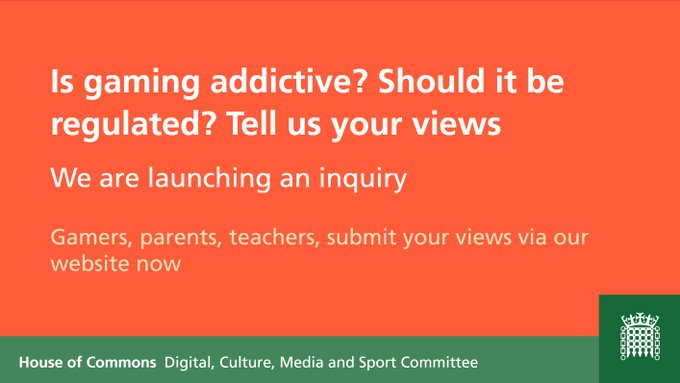Calling all gamers, game designers and experts: should gaming be regulated? What makes the UK a world leader in gaming and how can the industry be supported? Share your views with us now via our website, or retweet and tag a friend who can help >> https://bit.ly/2sCRcVp
Parliament wants your opinion on links between games and gambling
In the midst of all the hullabaloo over at Westminster right now, you'd think video games were at the bottom of the Parliamentary priority list. Thankfully, the Digital, Culture, Media and Sport Committee's work continues unabated, as the Commons Select Committee has now opened its inquiry into "addictive technologies" to the public.
Originally announced back in December, the inquiry seeks to "look at how the addictive nature of some technologies can affect users' engagement with gaming and social media, particularly amongst younger people". This could eventually inform government policy on the regulation of gaming, and help government "keep pace with the increasing digitisation and 'gamification' of people's lives".
As of yesterday, individual members of the public and organisations can now enter written submissions to the inquiry. If you want to write something yourself, make sure to read the terms of reference beforehand for information on the topics being addressed. Written evidence should have numbered paragraphs and be under 3000 words in length (a struggle, I know).
Subjects tackled by the inquiry:
- The immersive media industry
- The future of eSports in the UK
- The wider uses of "gamification" and VR/AR
- Tackling digital and gaming addiction
- The links between gaming and gambling
- Data security and infrastructure
The scope of the inquiry is broad, but it should offer the public a chance to give feedback on the influence of gambling in video games and gaming communities. This comes in the wake of increased international scrutiny of loot box microtransactions, and the Gambling Commission's talks with Twitch over the streaming of unlicensed casino games on the platform.
Along with the links between games and gambling, the inquiry will tackle the subject of gaming addiction. This will focus on the scale of the problem, the significance of game design in encouraging addiction, and how the problem might be managed. In the context of the World Health Organisation's announcement it intends to classify "gaming disorder" as a medical condition, gaming addiction now seems to be firmly in the sights of NGOs and regulatory bodies.
Beyond gaming, the inquiry will also examine the impact of augmented reality technologies, such as those used to make "deep-fake" films. If you're wondering what a deep-fake is, it's a video constructed by superimposing the face of one person onto another. Some of these are now so convincing that they are impossible to distinguish from reality, and are being used to create porn of celebrities and regular people. Grim stuff.
Somewhat more positively, it's good to see the government is paying attention to the ever-developing world of gaming and online communities. Whether this will lead to concrete policies and regulations is another matter: but the door has certainly been opened. If you have any thoughts on the topics, now is the time to make your voice heard.

